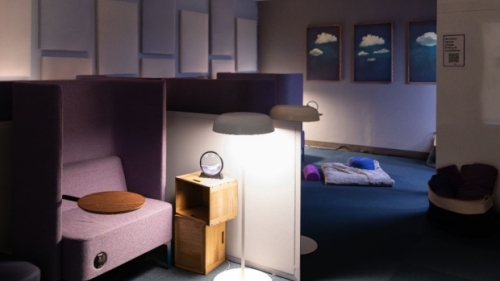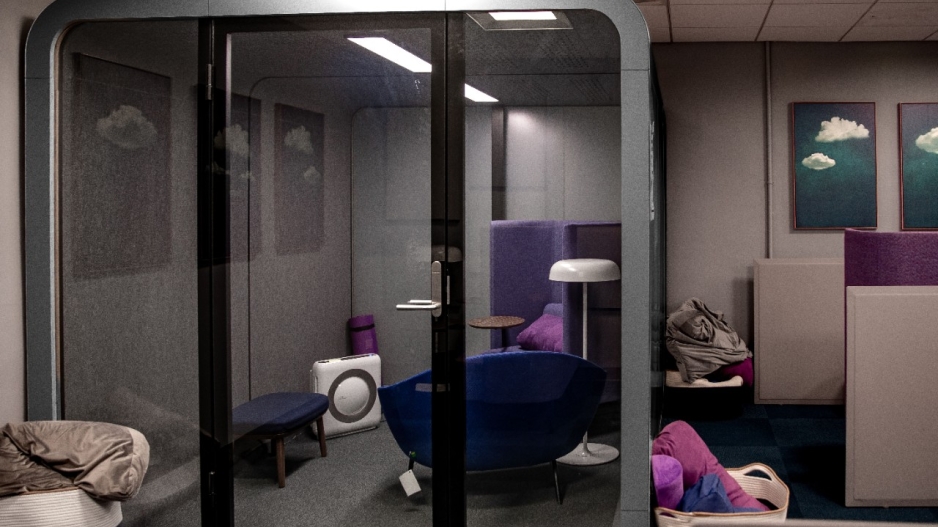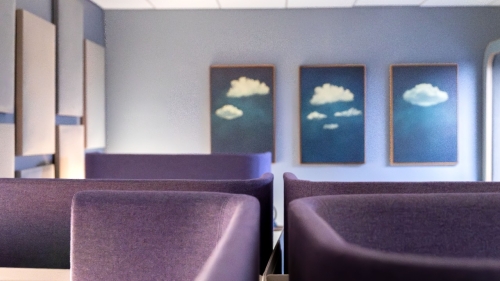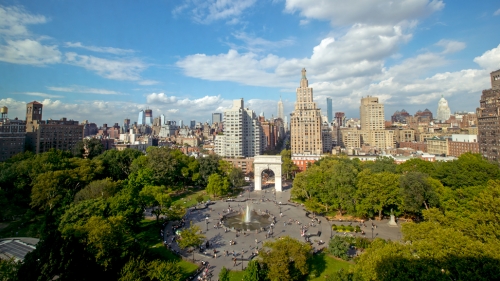The specially designed study room is on the first floor of Bobst Library. Two more rooms will open in the spring.
NYU Libraries has opened a low-sensory space on the first floor of Bobst Library, providing students who are neurodiverse with a dedicated room to support their academic success.
With the new space, and two more study rooms scheduled to open on the ninth floor in the spring of 2024, Bobst becomes one of only a handful of academic libraries to offer specially designed places for students who identify as having acute sensory needs.

The study room in Bobst has been designed for neurodiverse students and others who seek a calm study setting. Photo by Tracey Friedman.
A collaboration with NYU’s Moses Center for Student Accessibility and NYU’s Disability, Inclusion, and Accessibility Provostial Working Group, the first-floor room is outfitted with a sensory pod, high-backed chairs and table desks, bean-bag pillows, yoga mats for floor seating, adjustable lighting, and noise-canceling wall paneling. It can accommodate about 12-14 students at one time.
The rooms are tailored for library users who identify as being on the autism spectrum, who have ADHD or otherwise identify as neurodivergent, and those who have a mental health disability, such as Post Traumatic Stress Disorder or anxiety.
Planning for the low-sensory spaces began in 2019, when a graduate student in NYU Steinhardt’s Occupational Therapy department approached NYU Libraries about the benefits of dedicated rooms for neurodiverse students, explains Lauren Kehoe, Accessibility and Accommodations Librarian.
The number of students enrolled in the Moses Center’s Connections Program who identify as neurodiverse has increased by 45 percent in the last three years, according to the Center, which works with students to determine and implement accommodations and to connect them with programs and resources. One of its programs, Connections, aims to support neurodiverse students by providing individual and group services and by promoting a culture of acceptance and belonging.

Bobst Library has opened a study space designed to meet the needs of neurodiverse students and others. Photo by Tracey Friedman.
“The need for the space has grown due to the enrollment of more neurodiverse students in higher education and as a result of societal shifts to more openly discuss mental health and wellness across university campuses,” Kehoe says. “Since this first introduction, the Libraries has worked towards opening a unique academic space for the sole purpose of reducing stress and anxiety and to provide accessibility features so that neurodiverse students are able to customize their sensory needs.”
Similar rooms have opened in public libraries around the country, according to the American Libraries Association.
“We are so pleased to lead the charge to make academic libraries more inclusive and welcoming to all users. We are thrilled to welcome neurodivergent students into our new sensory space – and to help facilitate equal access to the resources and support services they need to thrive at NYU,” says Austin Booth, dean of the division of libraries.

The new room is the first of three study spaces specially designed to meet the needs of students who are seeking a low-sensory environment. Photo by Tracey Friedman.
The Libraries will facilitate the use of the first-floor space, with input and support from the Moses Center. (Students in the Moses Center’s Connection Program will automatically have access, based on availability, but any eligible student can request access from NYU Libraries directly.) The opening of two additional spaces in the spring is expected to expand access, library officials note.
The sensory rooms were developed with funding from the New York State Serving Students with Disabilities in Postsecondary Schools grant program and with help from the Moses Center for Student Accessibility, NYU Steinhardt's Department of Occupational Therapy, the NYU Ability Project, and the Disability, Inclusion, and Accessibility Provostial Working Group.
About NYU Libraries
The NYU Division of Libraries comprises five libraries in Manhattan, one in Brooklyn, and one each at its Abu Dhabi and Shanghai campuses. Its flagship, the Elmer Holmes Bobst Library on Washington Square, received 3 million visits last year. The Libraries’ online catalog provides access to a world of content, such as millions of book volumes, e-books, serial titles, oral histories, and documents from more than 43,000 linear feet of archives. Learn more about the NYU Libraries.
Press Contact
(212) 998-6829

